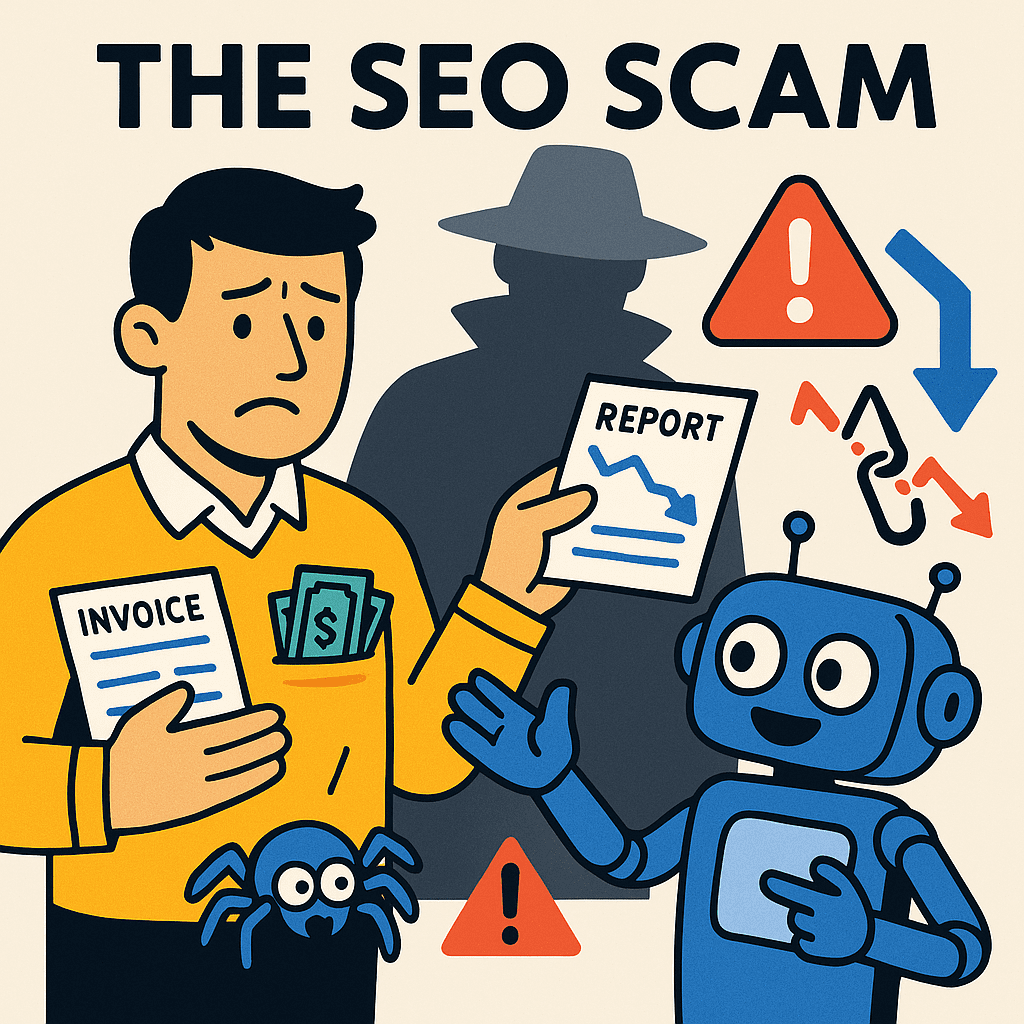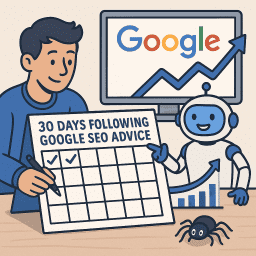The SEO Scam: What ‘Experts’ Don’t Want You to Reveal
Exposing shady tactics used to sell false promises

🚀 Stop Wasting Money on Bad SEO Services
SEO is essential for online visibility — and plenty of people know it. Unfortunately, that includes a growing number of so-called “SEO experts” who are more interested in taking your money than helping your business grow.
Over the years, we’ve seen it all: overpriced packages, meaningless reports, false guarantees, and outdated tactics dressed up as “advanced strategies.”
This post is your guide to spotting the SEO scam — and protecting your business from wasted time, money, and opportunity.
🚨 The Red Flags: How to Spot an SEO Scam
Let’s start with the most common warning signs that you’re being misled.
- 📦 “Guaranteed #1 Rankings” – No one can promise this. Google’s own guidelines warn against it.
- 📉 Instant Results – Real SEO takes time. Anyone claiming overnight success is either lying or using shady tactics that could get you penalised.
- 📄 Secret Sauce – If they won’t explain their methods or speak in vague terms like “special algorithm hacks,” run.
- 📊 Meaningless Reports – Monthly updates full of jargon and no clear ROI are designed to confuse, not inform.
- 💰 Suspiciously Cheap Packages – £99/month for “complete SEO”? You’ll get automated spam at best… or nothing at all.
🕳️ What They’re Actually Doing (or Not Doing)
Behind the scenes, many “experts” are doing very little — or worse, damaging your site. Common problems include:
- 🔗 Buying low-quality backlinks from link farms
- 📝 Stuffing content with keywords that make no sense
- 🧼 Ignoring technical SEO completely
- 📉 Using duplicate content across multiple clients
- 🕵️ Subcontracting to unknown freelancers with no accountability
And if Google catches on? It’s your site — not theirs — that pays the price.
🔍 Why Do People Fall for It?
Simple: SEO is complex, full of jargon, and often misunderstood. When someone says they’ll “handle it all” and make the phone ring tomorrow, it’s tempting to believe them.
Add to that:
- ⏱️ Business owners are short on time
- 📉 They may have tried DIY SEO and failed
- 💬 They trust referrals or flashy sales pitches
It’s not your fault. But it is your responsibility to ask questions.
✅ What Real SEO Actually Looks Like
Legitimate SEO is:
- 📈 Transparent – You know what’s being done and why
- 🧠 Insight-driven – Based on research, data, and audience behaviour
- ⏳ Long-term – It’s a process, not a one-off fix
- 🔧 Technical and creative – Fixing the backend while producing valuable content
- 📊 Measurable – You can track progress in real, understandable terms
A good SEO expert should be a partner, not a magician.
🛡️ How to Protect Yourself
Here’s how to avoid being scammed:
- ❓ Ask for a clear explanation of what’s included
- 🔎 Request access to tools like Google Analytics and Search Console
- 💬 Check reviews, testimonials, and case studies
- 📝 Make sure everything is in writing – especially deliverables
- 🚫 Walk away from anyone promising guaranteed rankings
Don’t be afraid to challenge vague answers. A trustworthy SEO provider will welcome your questions.
🧠 Final Thoughts: SEO Isn’t the Scam — But Some People Are
Search engine optimisation, when done properly, can transform your business. But when done poorly — or dishonestly — it can destroy your trust, budget, and online presence.
So don’t give up on SEO. Just give up on the nonsense.
Choose strategy over snake oil. Choose results over promises. And choose partners who value your success as much as you do.
🔗 Related Resources from The SEO Guide Book
- If you’re completely new to search engine optimisation, our SEO Basics guide is a great place to start.
- Fixing issues like missing title tags or slow site speed? Check out our On-Page SEO guide for a full breakdown.
- Technical issues can silently hold your site back — our Technical SEO page covers the essentials.
- Not ready to hire an expert? Our DIY SEO guide will walk you through the steps.
- Want to make sure you’ve covered the basics? Download our Free SEO Checklist and follow along.
📝 Recap and Clarify: Post-Specific FAQs
What is the SEO scam mentioned in the article?
The “SEO scam” refers to agencies and freelancers charging for outdated, manipulative, or ineffective services—often while hiding behind vague jargon and fake guarantees.
How can I tell if an SEO provider is scamming me?
Watch for red flags like guaranteed rankings, secret methods, lack of reporting, no clear strategy, or refusing to explain what they’re doing with your site.
Are “guaranteed first-page results” a scam?
Yes. No one can guarantee top rankings on Google—especially for competitive terms. These claims are misleading and often used by unscrupulous providers.
Is all cheap SEO bad?
Not all budget SEO is bad, but extremely cheap services often cut corners, use spammy tactics, or outsource work to unqualified providers, which can harm your rankings.
What’s the danger of black-hat SEO tactics?
Black-hat SEO uses manipulative techniques to game search engines. While it may produce short-term gains, it can result in penalties or complete deindexing by Google.
What should a good SEO provider offer?
A trustworthy SEO provider offers transparent reporting, tailored strategy, ongoing improvements, and clear communication based on Google’s own best practice guidelines.
How important is SEO reporting?
Regular, transparent reporting is critical. It helps you understand what work is being done, how your site is performing, and where your money is going.
What role does trust play in choosing an SEO partner?
Trust is essential. Look for a provider with proven experience, real reviews, clear methods, and a willingness to educate—not intimidate—you about the SEO process.
Why do some SEO agencies hide what they’re doing?
Some agencies use secrecy to justify inflated fees or to cover up the fact they’re doing very little. A lack of transparency is a major warning sign.
How can I protect myself from SEO scams?
Do your research, ask for case studies or references, avoid anyone promising instant results, and demand transparency in pricing, process, and performance metrics.

















